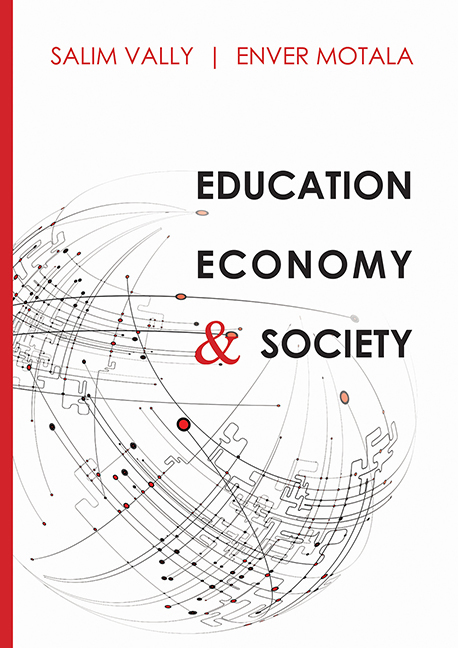Book contents
- Frontmatter
- Contents
- Foreword
- Preface
- About the contributors
- Acknowledgements
- Abbreviations and acronyms
- Chapter 1 ‘NO ONE TO BLAME BUT THEMSELVES’: Rethinking the Relationship between Education, Skills and Employment
- Chapter 2 EDUCATION AND ECONOMY: Demystifying the Skills Discourse
- Chapter 3 UNIVERSITIES AND THE ‘KNOWLEDGE ECONOMY’
- Chapter 4 GOING AROUND IN CIRCLES: Employability, Responsiveness, and the Reform of the College Sector
- Chapter 5 BUILDING A TRANSFORMATIVE PEDAGOGY in Vocational Education
- Chapter 6 SKILLS? WHAT SKILLS? JOBS? WHAT JOBS? An Overview of Research into Education/Labour Market Relationships
- Chapter 7 DEBATING THE NEXUS of Education, Skills and Technology in the Age of Lean Production: A Case Study of the ArcelorMittal Vanderbijlpark Plant
- Chapter 8 SKILLS, JOBS AND DECEPTION: Examples from the South African Workplace
- Chapter 9 ON THE USE AND ABUSE OF EDUCATION: Reflections on Unemployment, the ‘Skills Gap’ and ‘Zombie Economics’
- Chapter 10 THE YOUTH WAGE SUBSIDY in South Africa: Employment, Skills and ‘Churning’
- Chapter 11 EPISTEMIC INJUSTICE and the Struggle for Recognition: Human Dignity and the Recognition of Prior Learning
- Chapter 12 (RE)CLAIMING WORKERS' EDUCATION
- Chapter 13 SKILLS DEVELOPMENT in Post-Apartheid South Africa: Issues, Arguments and Contestations
- Index
Chapter 3 - UNIVERSITIES AND THE ‘KNOWLEDGE ECONOMY’
Published online by Cambridge University Press: 16 February 2020
- Frontmatter
- Contents
- Foreword
- Preface
- About the contributors
- Acknowledgements
- Abbreviations and acronyms
- Chapter 1 ‘NO ONE TO BLAME BUT THEMSELVES’: Rethinking the Relationship between Education, Skills and Employment
- Chapter 2 EDUCATION AND ECONOMY: Demystifying the Skills Discourse
- Chapter 3 UNIVERSITIES AND THE ‘KNOWLEDGE ECONOMY’
- Chapter 4 GOING AROUND IN CIRCLES: Employability, Responsiveness, and the Reform of the College Sector
- Chapter 5 BUILDING A TRANSFORMATIVE PEDAGOGY in Vocational Education
- Chapter 6 SKILLS? WHAT SKILLS? JOBS? WHAT JOBS? An Overview of Research into Education/Labour Market Relationships
- Chapter 7 DEBATING THE NEXUS of Education, Skills and Technology in the Age of Lean Production: A Case Study of the ArcelorMittal Vanderbijlpark Plant
- Chapter 8 SKILLS, JOBS AND DECEPTION: Examples from the South African Workplace
- Chapter 9 ON THE USE AND ABUSE OF EDUCATION: Reflections on Unemployment, the ‘Skills Gap’ and ‘Zombie Economics’
- Chapter 10 THE YOUTH WAGE SUBSIDY in South Africa: Employment, Skills and ‘Churning’
- Chapter 11 EPISTEMIC INJUSTICE and the Struggle for Recognition: Human Dignity and the Recognition of Prior Learning
- Chapter 12 (RE)CLAIMING WORKERS' EDUCATION
- Chapter 13 SKILLS DEVELOPMENT in Post-Apartheid South Africa: Issues, Arguments and Contestations
- Index
Summary
Cometh The Time, Cometh The Book
Associate Professor David Cooper (2011) of the Department of Sociology at the University of Cape Town has serendipitously published a book on the changes that are taking place in higher education, especially in South Africa, which has made my task much easier than it might otherwise have been. My analysis and some of the suggestions I will make in this chapter are heavily dependent on Cooper's paradigm, the evolution of which he has so carefully described in a work that, in my view, should become essential reading for all university managers and academic leadership. Having been involved with universities throughout my adult life, it is natural that I have developed a few deeply held prejudices and preferences, some of which will undoubtedly force their way through my effort to present as thoughtful an Impulsreferat as I am capable of doing.
Without beating about the bush, let me get to the essential issues. According to Cooper (2011), what he calls the ‘second academic transformation’, which is manifest in the ‘third mission’ of the university, is causally related to the ‘third capitalist industrial revolution’. This fact has very clear and specific consequences for the structures and the institutional culture of the university in both the North and the South of the economic globe. In particular, the university has – potentially and in many cases actually – become a key component of what is called the ‘knowledge economy’. To put it in simple narrative terms: to the first mission (teaching) and the second mission (curiosity driven basic research) of the university, starting in the late 1960s and early 1970s in the United States (US), a third mission (economic development, with its institutional corollary of use inspired basic research) has been added as the result of the symbiotic relationship that developed between knowledge production and transnational corporate requirements and modalities.
The intricate relations between technological developments after World War II; the micro-electronic and molecular biology revolutions; and the economic dominance of trans-national corporations with the corollary vulnerabilities for national sovereignty, all in the context of the hegemony of the monetarist neo-liberal economic orthodoxy after 1973, more or less, are meticulously recorded in Cooper's (2011) study.
- Type
- Chapter
- Information
- Education, Economy & Society , pp. 48 - 56Publisher: University of South AfricaPrint publication year: 2014



